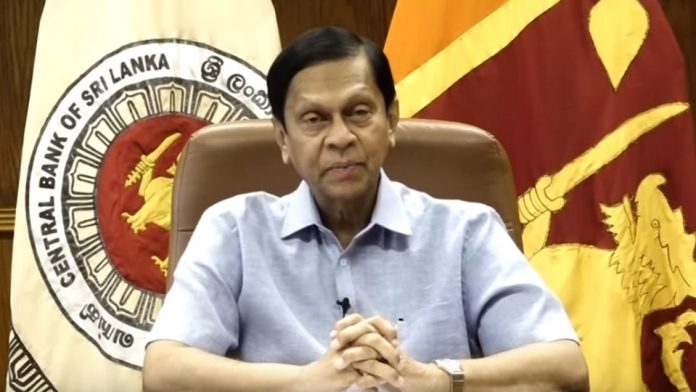The Central Bank (CB) has heralded its settling of a maturing $500 million sovereign debt on Tuesday making use of its scarcely available foreign currency reserves to repay bond holders but at the same time, economists said its total foreign currency borrowings has skyrocketed.
CB Governor Ajith Nivard Cabraal told a media conference on Thursday January 20 that Sri Lanka has honoured its debts without blemish and the CB has done it as usual notwithstanding the ‘cry’ to default by some misguided elements.
The repayment of the $500 million International Sovereign Bond (ISB) demonstrated that so-called economic experts, politicians and rating agencies were wrong, he said.
He noted that the over subscription of a recent Rs. 97 billion Treasury bill auction was an indication of investor confidence, disproving predictions of defaulting of the ISB by some economists and interested parties.
Responding to questions, Mr. Cabraal categorically stated that there was no intention of devaluation of the rupee or seeking IMF assistance as the CB’s Monetary Board is following the necessary economic programme.
The rupee depreciated by 7 per cent against the dollar in 2021 and has been broadly stable at Rs. 203 thus far in 2022, he added.
“Those interested parties who advocated default obviously have no knowledge about ISBs or international obligations,” he said, adding that they also have no clue about the repercussions of sovereign default.
“It may even be that they know the consequences, but would still prefer the country to be destroyed so that they can be getting political advantage,” he said, adding that ISB default is disastrous for the country.
The CB is also following a restructuring process like obtaining a swap facility to boost reserves and make repayments of debt fulfilling its obligations without suspending the repayment which is disastrous for the country, he opined.
“A country does not need outside enemies when it has some persons or so called experts who vociferously advise the authorities to default on international loans and dishonour sovereign obligations.” He asked whether any foreign supplier will be insane enough to make any kind of supply to a defaulting country?
The last minute credit line from India allowed some breathing space while the funds were released by the CB helped by New Delhi’s offer of a $400 million currency swap with the Reserve Bank of India and a deferment by two months of repayment of a $515 million loan.
This $515 million loan facility has been offered by Asian Clearing Union, a network of nine central banks in the region, followed by ministerial-level discussions with the South Asian neighbours.
A relief package from India with a $1 billion credit line for essential food and medicine — that follows a 10 billion yuan ($1.5 billion) swap with the People’s Bank of China in late December – also helped to strengthen foreign exchange reserves which stood at $3.1 billion in December 2021.
Referring to measures taken by the CB to tackle the dollar crisis, Mr Cabraal said that all local commercial banks have been directed to bear payments for fuel and essential commodities with the aim of facilitating dollar payments in the process of clearing Letters of Credit (LCs) held up in banks.
Banks should make use of its dollar reserves in addition to CB release of dollars from time to time to clear shipments of fuel and essential commodities giving a special priority rather than non-essential imports, Governor Cabraal disclosed.
While usually state banks opened LCs for fuel imported by the Ceylon Petroleum Corporation, now other banks too are allowed to share it, he added.
In accordance with another CB directive, registered tourist hotels and hospitality industry establishments have been asked to accept only foreign exchange for services rendered to foreign travelers and residents outside Sri Lanka.
The Monetary Board has also decided to distribute the financing of essential import bills for fuel purchases among the licensed banks in proportion to their foreign exchange inflows.
It has also decided to extend the payment of an additional Rs. 8 per US dollar for workers’ remittances paid in addition to the incentive of Rs. 2 per US dollar offered under the “Incentive Scheme on Inward Workers’ Remittances” until 30 April 2022.
Measures will be taken to reimburse the transaction cost borne by Sri Lankan migrant workers through the payment of Rs. 1,000 per transaction, when remitting money to rupee accounts via licensed banks and other formal channels with effect from 01 February 2022.
It will introduce higher interest rates for both foreign currency and rupee denominated deposits of migrant workers.The Monetary Board was of the view that the new measures will curtail the possible build-up of underlying demand pressures in the economy, which would also help ease pressures in the external sector, thus promoting greater macroeconomic stability
